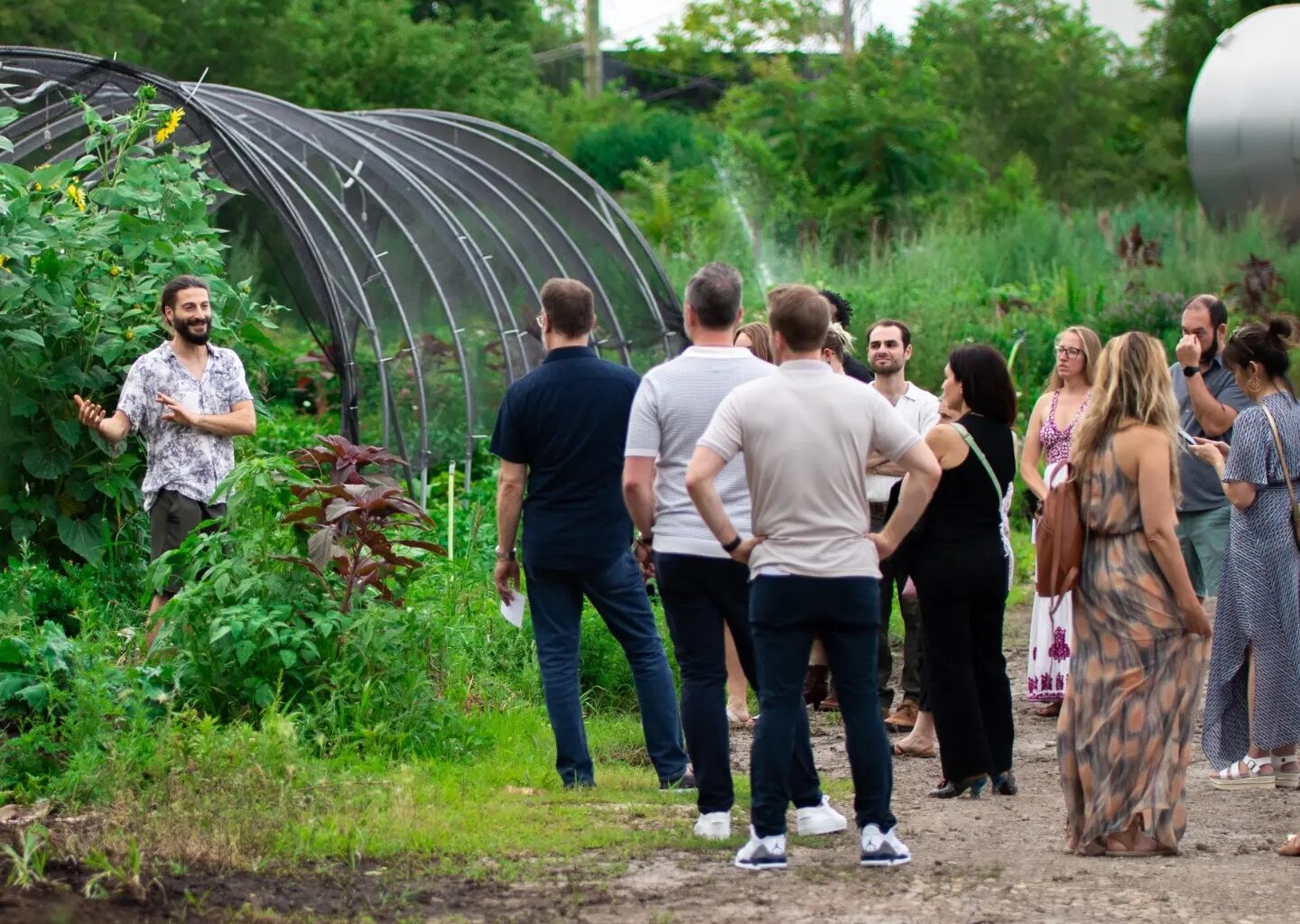BACK OF THE YARDS — Adam Pollack was fresh off a summer internship at a North Carolina farm when he decided to try growing microgreens in his Logan Square apartment.
Pollack was feeling depleted after working in restaurants, and he was eager to put his new farming skills to work. Plus, microgreens grow so quickly in small spaces, he knew he could yield a crop almost immediately.
A decade later, Pollack’s microgreens, along with a colorful array of edible flowers, herbs, lettuces, tomatoes, vegetables and specialty greens, can be found in restaurants and homes across the city via his company, Closed Loop Farms. Every week, the farm makes more than 200 produce deliveries to some 150 restaurants as well as to 50 homes across Chicago. Closed Loop products can also be found at Agora Market, 2134 N. Western Ave. in Bucktown, and Wild Onion Market, 7007 N. Clark St. in Rogers Park.
“If you’re going to a restaurant in Chicago and there are microgreens or flowers on your dishes, there’s a pretty good chance they come from us,” said Pollack.
The farm’s edible flowers even had a cameo on “The Bear” Season 4, delicately adorning pastry chef Marcus’ desserts.
Closed Loop Farms operates from the sprawling 6,000-square-foot basement of The Plant, 4459 S. Marshfield Ave., a sustainable food business incubator located in what was once a meat product production plant in Back of the Yards.
There, Pollack and his tight-knit team grow some 20 varieties of microgreens year-round in a space packed with floor-to-ceiling metal shelves holding plant-filled trays in various stages of growth. Purple- and pink-hued lights sub in for the sun, creating an otherworldly vibe.
Outside the building, they grow a wide variety of produce on a half-acre plot, formerly a gravel parking lot covered with wood chips and organic compost. The used soil from the microgreens grown inside is recycled into the soil of the outdoor farm. A hoop house added five years ago extends the growing season.
The diversity of plants at Closed Loop Farms yields a range of insects and the animals who like to eat them — all of which creates a thriving ecosystem where pest control management is handled by Mother Nature.
Crop diversity also makes good business sense, Pollack said.
“If something doesn’t grow well, we have something else to substitute for it,” he said.
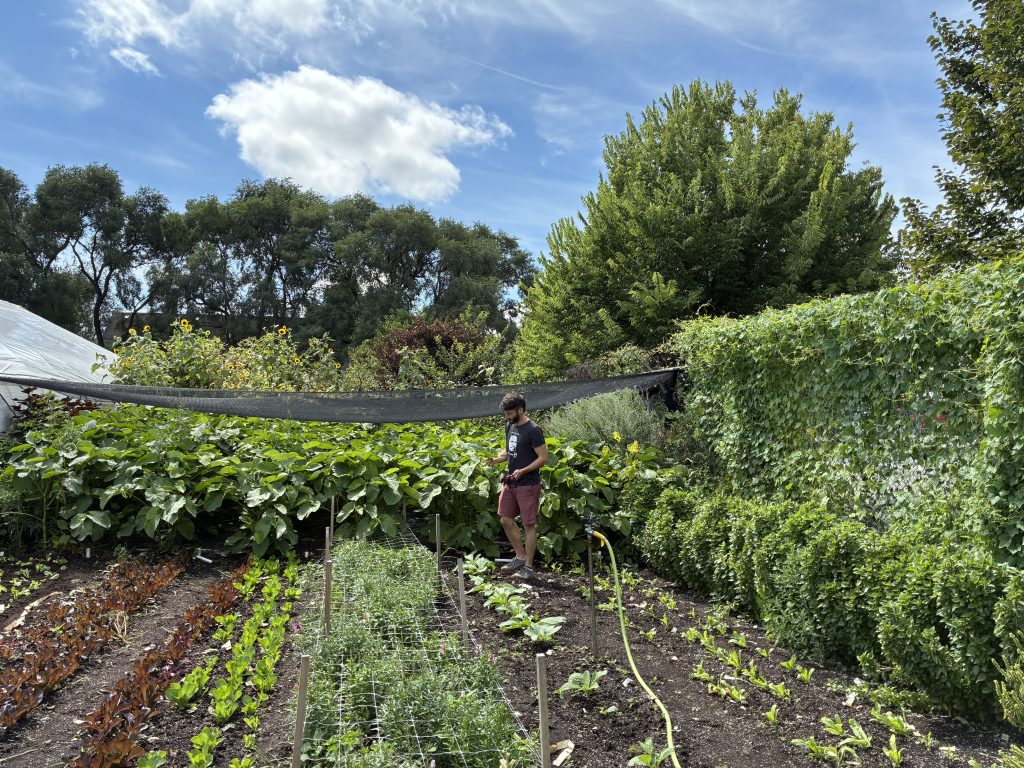 Adam Pollack of Closed Loop Farms checks on crops in the outdoor plot at The Plant, 4459 S. Marshfield Ave. He started his farm from a few trays of microgreens in his Logan Square apartment. Credit: Lisa Shames/Block Club Chicago
Adam Pollack of Closed Loop Farms checks on crops in the outdoor plot at The Plant, 4459 S. Marshfield Ave. He started his farm from a few trays of microgreens in his Logan Square apartment. Credit: Lisa Shames/Block Club Chicago
Growing At Home, And Delivering To Homes
When Pollack returned to Chicago and began his farming experiment in his apartment, he chose microgreens because they require minimal investment and space, and they grow quickly.
“I wanted to learn how to farm to become a better chef, but I was also a little burned out on cooking, so it was a fun break,” said Pollack of his time at that North Carolina farm. “Eventually, I began thinking I just want to keep doing this.”
By luck, he connected with Latin United Community Housing Association, a management company that offered him free usage of a small plot of land in Humboldt Park for a summer produce garden in exchange for involving nearby tenants in the gardening process as part of its wellness programs.
Around that time, Pollack began reaching out to restaurants to sell his produce. As a former chef at restaurants like Avec, Topolobampo and Kai Zan, he had connections.
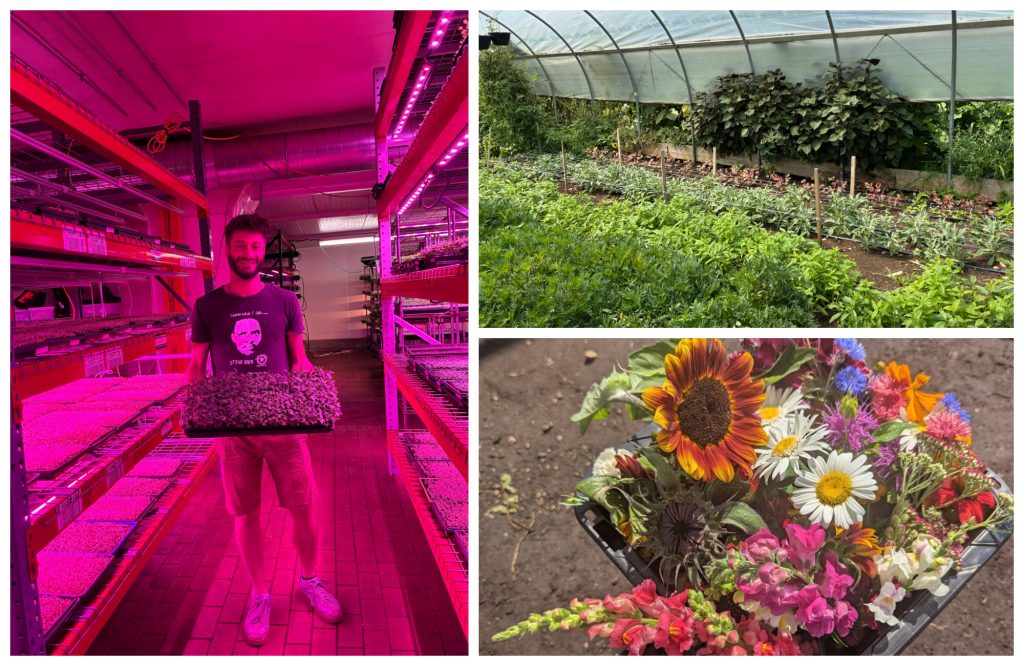 Adam Pollack started growing microgreens in his Logan Square apartment a decade ago. Now based at The Plant, his Closed Loop Farms grows produce and edible flowers for more than 150 restaurants in Chicago. Credit: Lisa Shames/Block Club Chicago; Instagram/Closed Loop Farms
Adam Pollack started growing microgreens in his Logan Square apartment a decade ago. Now based at The Plant, his Closed Loop Farms grows produce and edible flowers for more than 150 restaurants in Chicago. Credit: Lisa Shames/Block Club Chicago; Instagram/Closed Loop Farms
As demand grew for his produce and especially his microgreens, so did the need to find a larger space. A friend turned Pollack onto The Plant, where for the first month, he rented a 10-by-15-foot space for $75. More restaurant clients meant more space at The Plant. Two years after moving in, he began cultivating the outdoor space.
Closed Loop was experiencing slow but steady growth until COVID — and then everything changed. With 100 percent of their sales from restaurants, the farm had to make a major shift that included creating a website.
“We didn’t have [a website] before because we took our orders from texts and emails from chefs,” said Pollack.
It became clear very quickly that switching to a home delivery business and working with other local producers to bundle orders was the financially feasible way to go. The stay-at-home order was issued on a Sunday night, and Closed Loop made its first home deliveries the following Tuesday, said Pollack.
“I’ve always thought there’s a big opportunity to spread the microgreens gospel, so to speak, beyond restaurants,” he said. “When COVID hit, it was like, yeah, now’s the time.”
“I eat so many microgreens at home, and I’ve always believed in them as something that makes sense,” said Pollack, who recommends home cooks add the deeply flavorful greens to sandwiches, pizza, eggs, avocado toast and even Chinese takeout.
24 Hours From Harvest To Restaurant Kitchen
Once restaurants began to reopen, the farm’s business model shifted once again, though Pollack continued home deliveries along with partnerships with local purveyors like Vargo Brothers and Kombuchade.
In addition to the produce it grows, Closed Loop also works with chefs to accommodate special requests.
“We like to source our roses and anise hyssops from Closed Loop,” said chef John Shields of three Michelin-starred Smyth. “We admire their commitment to a local and perfect product.”
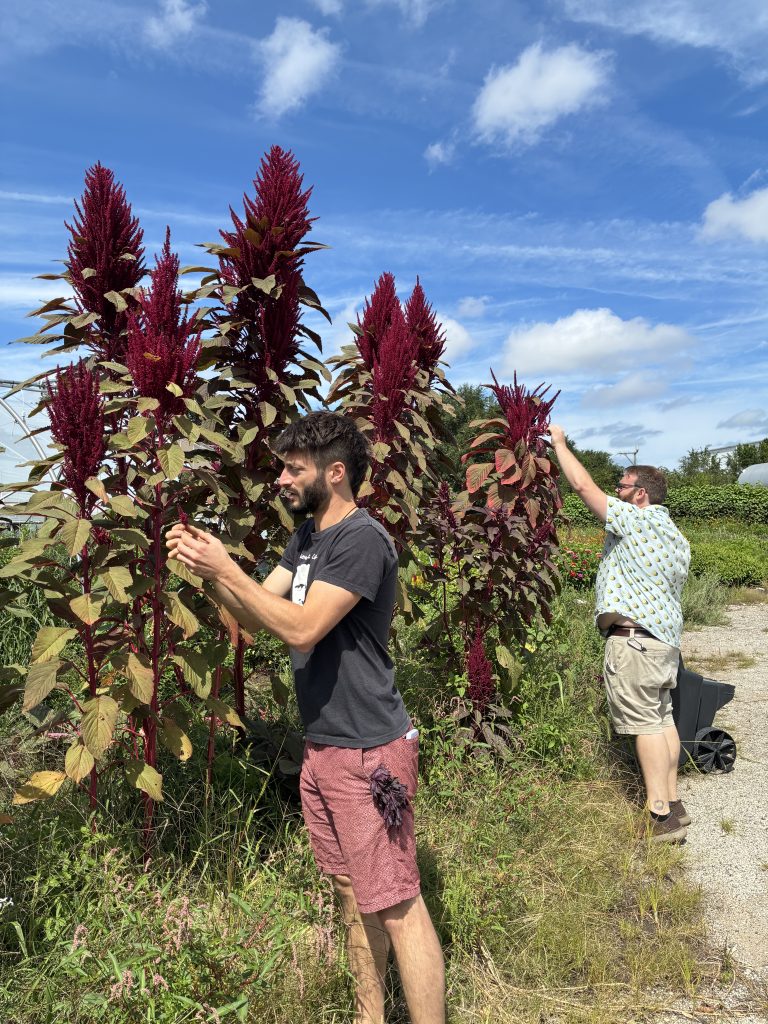 Closed Loop Farms founder Adam Pollack (left) and home delivery manager Jake Chappell tend to amaranth growing on the farm’s outdoor plot at The Plant. Credit: Lisa Shames/Block Club Chicago
Closed Loop Farms founder Adam Pollack (left) and home delivery manager Jake Chappell tend to amaranth growing on the farm’s outdoor plot at The Plant. Credit: Lisa Shames/Block Club Chicago
Those requests can sometimes be a gamble, said Maggie Dohr, Closed Loop Farms operations manager.
“We try some things and sometimes they work and sometimes they don’t and sometimes we end up bringing it into our rotation,” she said.
Closed Loop’s Big Leaf microgreens mix — sunflower shoots, purple radish microgreens and nasturtium leaves — was created for chef C.J. Jacobson of Lettuce Entertain You’s Aba and Ema restaurants. It’s now one of Closed Loop’s best-sellers.
Hoja santa, a fragrant herb often used in Mexican cuisine, was another special request that’s now a staple crop at Closed Loop.
One of the farm’s competitive advantages is it proximity to its customers, said Jake Chappell, whose title is home delivery manager but who, like others at Closed Loop, wears many hats, including writing its blog posts.
“We always harvest within 24 hours of delivery, which is pretty unique,” Chappell said. “That’s definitely different than getting it shipped from California or somewhere else or at the grocery store.”
That hyperlocal freshness is apparent to restaurant customers like chef Bryan McClaran of Best Intentions.
“I love having fresh, vibrant greens from a local purveyor,” McClaran said. “They’ve worked time and again to get the exact things we need for both our food and beverage programs.”
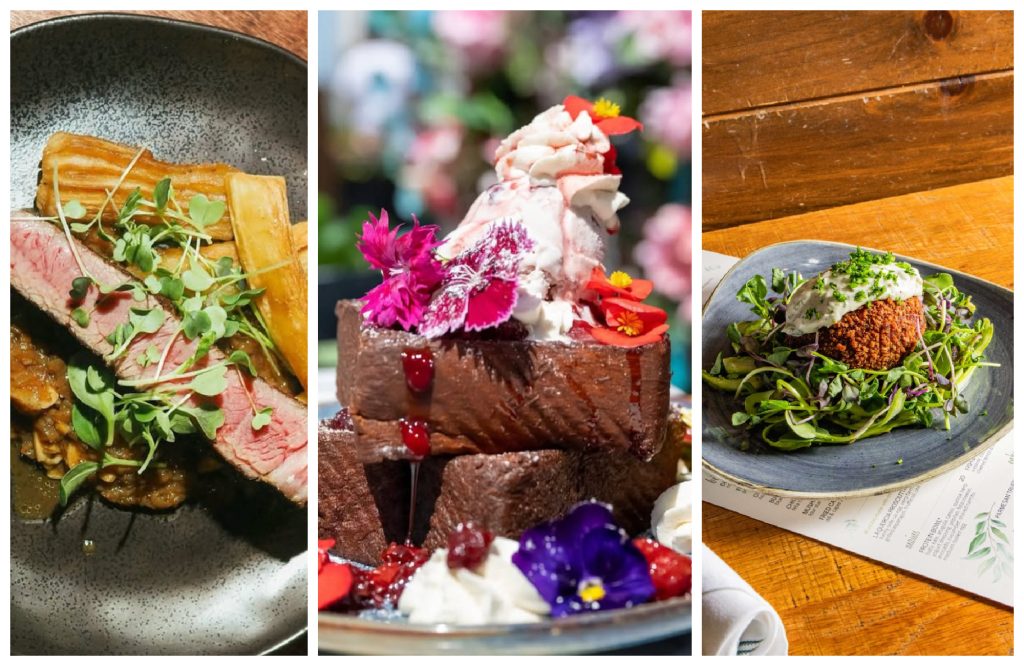 Dishes featuring microgreens and edible flowers grown at Closed Loop Farms include (from left): tatsoi microgreens and steak at CMB Catering; cherry French toast at the Londonhouse; and a Scotch egg with trout at The Dearborn. Credit: Instagram/Closed Loop Farms
Dishes featuring microgreens and edible flowers grown at Closed Loop Farms include (from left): tatsoi microgreens and steak at CMB Catering; cherry French toast at the Londonhouse; and a Scotch egg with trout at The Dearborn. Credit: Instagram/Closed Loop Farms
Sustainable Growth
Beyond the quality of its ingredients, Closed Loop Farms is driven by two other factors, Pollack said: environmental stewardship and social impact.
“The thing that got me more into farming was the environmental aspects of it and wanting to grow food in a responsible way and have that connection to the food we eat,” he said.
Reusable packaging was a priority from the get-go, with the company eschewing the more traditional disposable plastic clamshell containers. Knowing that chefs were already familiar with the standardized hard plastic rectangular delivery boxes, Pollack opted for those.
The boxes had a bonus feature: They stack easily in a walk-in refrigerator.
“I feel like to a lot of people these things would sound like minor little conveniences, but when a good portion of your job as a chef is keeping the fridge organized, it’s a big deal,” said Chappell, who met Pollack at Avec where he was also a chef. “The shelves in a fridge are built to the right height to stack these boxes up. That’s the level of integration these boxes are in restaurants.”
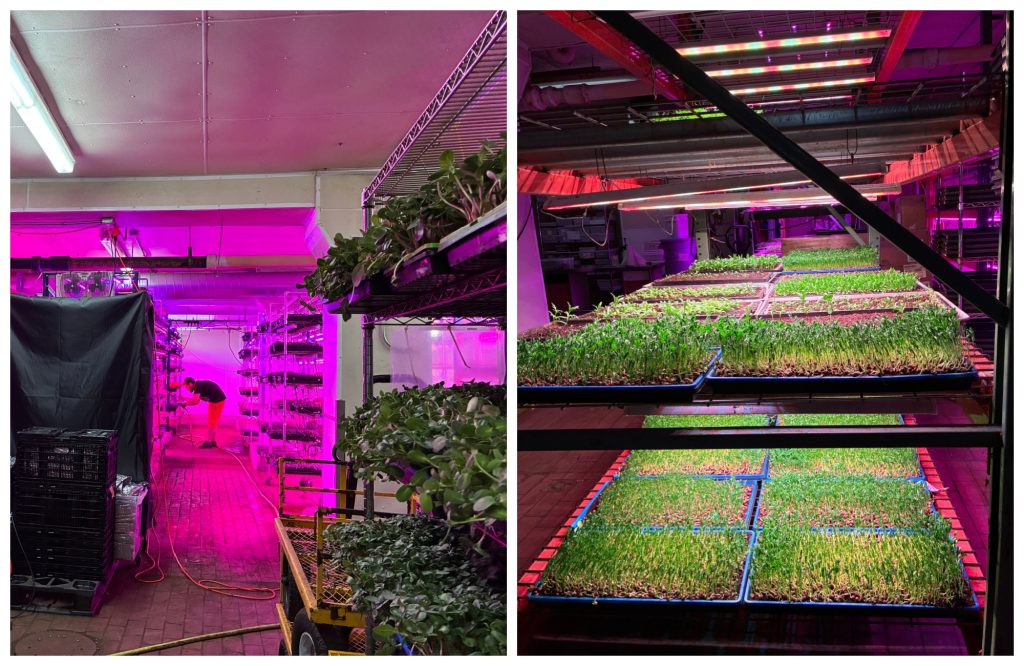 Closed Loop Farms grows 20 varieties of microgreens year-round in the sprawling basement of The Plant, 4459 S. Marshfield Ave. Credit: Lisa Shames/Block Club Chicago
Closed Loop Farms grows 20 varieties of microgreens year-round in the sprawling basement of The Plant, 4459 S. Marshfield Ave. Credit: Lisa Shames/Block Club Chicago
Growth at Closed Loop not only applies to the products it grows but also its staff. The farm now employs 11 year-round, full-time staff and four part-timers, plus about four seasonal workers. The starting wage on the farm is $20 an hour. The company pay 50 percent of health insurance, and a retirement plan is in the works, Pollack said.
“My bigger focus over time has been our staff and how we can make this a place that provides a living for folks and be a place where people can stay for a long time and continue to build something that’s sustainable for everyone that works here,” he said. “Hopefully, I’ve created a nice place for people to work that’s doing something meaningful, too.”
Listen to the Block Club Chicago podcast:
